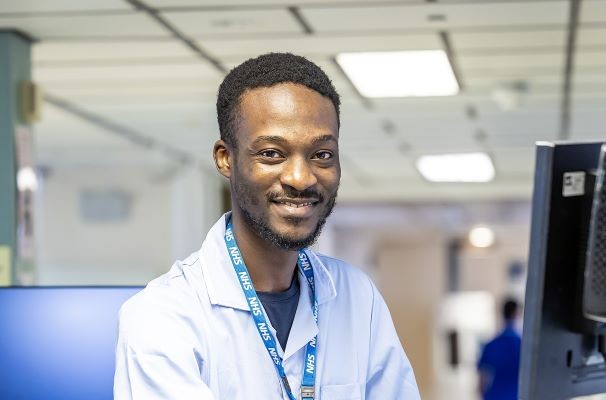Browse our A-Z of services
Frimley Health is supported by a number of community hospitals to provide on going rehabilitation.
These include:
Farnham Hospital for patients living in the Surrey Heath, North East Hampshire and Farnham.
Heathlands Intermediate Care unit for those living in Bracknell Forest.
Services provided for patients registered with a GP in the East Berkshire area are provided by Berkshire Healthcare. More information can be found on the Berkshire Healthcare website.
The community inpatient wards provide a rehabilitation service for patients transferred from an acute hospital, such as Wexham Park and Frimley Park hospitals Patients may also be referred to the community services by their own GP or a community health teams.
We aim to return patients to independent living or with support from social services or a care agency. Some patients may be transferred from the community hospital to to a care home.
Our approach is person-centred, comprehensive and cohesive to enable people to remain as independent as possible within the community.
Patients being looked after by the community teams, or their carers, can also contact the NE Hants Single Point of Access (SPA) based at Fleet Hospital via telephone if they have a problem or query.
Patients are referred to the North East Hants Community teams via Single Point of Access. These come from GPs, practice nurses, discharges from hospital and other services within the area such as care agencies and the local hospice.
The community nursing team visit people in their homes to provide nursing care, support, and treatment at times when their health, wellbeing or condition prevents them from attending a GP or a clinic.
They help patients to manage their own conditions and regain or maintain their independence so that they can remain at home wherever possible.
The community nursing teams are specialists in providing nursing care, advice, support and treatment to people at home or in a clinic including:
- Holistic nursing assessments
- Administration of medication such as insulin, or intravenous antibiotics and other injections
- PICC line care and disconnection of chemotherapy infusions
- Care and support with urinary indwelling, urinary catheters, urethral and suprapubic
- Continence assessments
- Assessments for long term conditions
- Care and treatment of complex wounds pressure ulcer care and prevention and management of pressure ulcers
- Leg ulcer care with prevention and treatment
- Wound care including simple and complex wounds
- Venepuncture
The community matron service
Work in partnership with primary and secondary care as part of the Integrated Care Team to facilitate safe discharge home from hospital, prevent unnecessary admission to hospital and provide an alternative to A&E attendance. This includes patients living in nursing and residential homes.
The team assesses patients at high risk of unnecessary admissions to hospital and uses a proactive approach to promote wellness and early recognition of disease exacerbation. The team initiates appropriate interventions to improve patient outcomes and reduce the likelihood of unnecessary hospital admissions.
The service will refer patients to other services to help promote independence and self-management of an individual’s long-term condition.
The community heart failure specialist service provides nursing support, management and advice to people with chronic heart failure in a community setting.
The service is accessible to patients with a heart failure diagnosis following a cardiologist review, providing support, advice and specialist intervention, including medicines management. The heart failure specialist nurse also provides advice and support to healthcare professionals in both general practice and the wider community setting, via telephone, electronically and face to face.
Management goals:
- Medication optimisation
- Lifestyle and education support
- Symptom control
- Hospital admission avoidance
As part of the community heart failure service we run a patient education / support group in Aldershot. You may be referred for this group by your healthcare professional.
At your appointment a clinical assessment will be performed by the heart failure specialist nurse. Your blood pressure, heart rate and weight will be measured. You'll be advised on the best actions to take and evidence based medications as appropriate for your condition.
This service consists of two teams: enhanced recovery and support at home (ERS) and community therapies.
Enhanced recovery and support at home (ERS)
Provides support to patients in their own homes to allow them to either stay at home, instead of being admitted to hospital, or be discharged from hospital earlier to continue their care at home.
The team consists of occupational therapists, physiotherapists, nurses, associate practitioners, rehab support workers and administrators. They provide a short term service whilst patients recover from being unwell and regain confidence and independence with care and support needs.
Community therapies
Provide rehab to patients in their own homes.
Occupational therapists, physiotherapists and associate practitioners undertake goal orientated rehab with patients. This can include:
- improving walking and balance
- managing the stairs
- getting out and about again
- regaining use of your hands eg following a stroke
- falls assessments and advice / treatment
- posture management
The team assess for, and issue, walking aids and other equipment that helps people to be independent in their own homes.
The community MS service provides specialised care to patients who have a confirmed diagnosis multiple sclerosis (MS), in a clinic location close to the patient's address, or at home. Working closely with local GPs, the team monitors and manages patients with higher levels of disability who either can't access a neurologist, or are under the care of neurology and the MS team at Frimley Park Hospital.
Any patient with a confirmed diagnosis of MS can be seen by the team.
The service also supports patients who have chosen to have their neurology care or disease modifying drug (DMD / DMT) treatment provided by another hospital outside of the area. This includes Guildford, Southampton, Ashford and St Peter’s, St George’s, Queens Square and Imperial hospitals.
New referrals to the MS service
Patients will have an initial appointment, usually at home, with the multiple sclerosis specialist nurse (MSSN). This usually takes up to two hours, with a full assessment and an agreed plan of care that is tailored to your needs. Any further appointments are normally either in a clinical setting, or by telephone, video link or at home if deemed clinically appropriate.
The community MS service
- Supports people from the first diagnosis throughout their multiple sclerosis journey.
- Proactively reviews people at agreed intervals, working with them to agree onward actions or goals at the end of each appointment.
- Refers people on to the appropriate members of the health and social care teams.
- Is a point for contact for known patients to contact should they experience acute deteriorating MS symptoms or MS relapse.
- Provides information and support regarding symptom management and where medication is indicated liaising with relevant consultants, and / or your GP.
- Liaises with relevant consultants, MS teams in hospital for further treatment and management.
- Provides information, education and support to carers and family members.
- Assists with the decision-making process where disease modifying treatments are indicated.
The community MS service is not a modifying drug (DMD) prescribing centre however the clinicians have experience of monitoring these patients and their treatment . The local prescribing centres are either at Frimley Park Hospital or Royal Surrey County Hospital. .
Patients known to the service have open access to the community MS service between planned review appointments. If a patient is experiencing an MS relapse or acute deteriorating symptoms which is exacerbating their MS please contact the service for advice and support.
The community MS service is happy to hear from patients with a confirmed MS diagnosis not known to the service, but who require more information about the service or other MS services in the local area.
If a patient is looking for further education or advice please refer to the MS charities listed below who provide good quality information and advice.
More information on multiple sclerosis
Multiple Sclerosis Trust
0800 032 38 39
www.
Multiple Sclerosis Society
0808 800 80 00
www.
MS-UK
0800 783 05 18
www.ms-uk.org
Other useful websites
Citizens Advice Bureau
0800 144 8848
www.citizensadvice.org.uk
• Benefits
• Housing
• Employment
• Debt
• Family issues
• Consumer issues
Community inpatient therapy is the name of the team that provides therapy input during a patient's stay at Farnham Hospital or at Heathlands Intermediate Care Unit. It is jointly delivered by HCRG and FHFT.
Our team of physiotherapists and therapy assistants work closely with the wider team to provide comprehensive assessment, treatment and rehabilitation. Treatment often includes education, advice and exercise to maximise independence and self-management strategies.
Occupational therapists (OT) work with patients to find practical solutions that can help improve their independence to participate in daily activities. This can include personal care tasks such as washing and dressing, and domestic tasks such as preparing a hot drink.
The OT can then understand what care and equipment they might need to help them at home. This will be organised, and we may ask family members to take home some equipment for the patient. OTs may also provide information such as home furniture heights. If needed the OT may also visit your home (with your consent), and advise on changes that could be made to help you.
Whilst an OT and / or physiotherapist may assess the patient and determine a rehabilitation plan, the wider team will identify rehabilitation activities, most of which will be undertaken independently of the therapy staff. This could be getting washed and dressed every day, walking in your bedroom, going to the dining room for your meals or practising exercises etc.
The therapy team will complete the necessary assessments and prescribe your rehabilitation activities, however the expectation is you will undertake this programme independently, with the support of your visitors and with the wider team in the unit.


